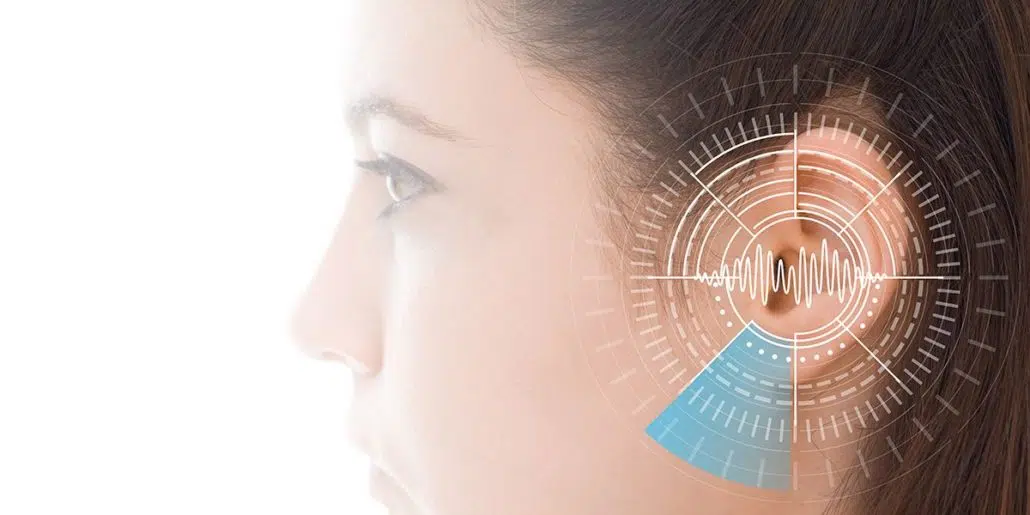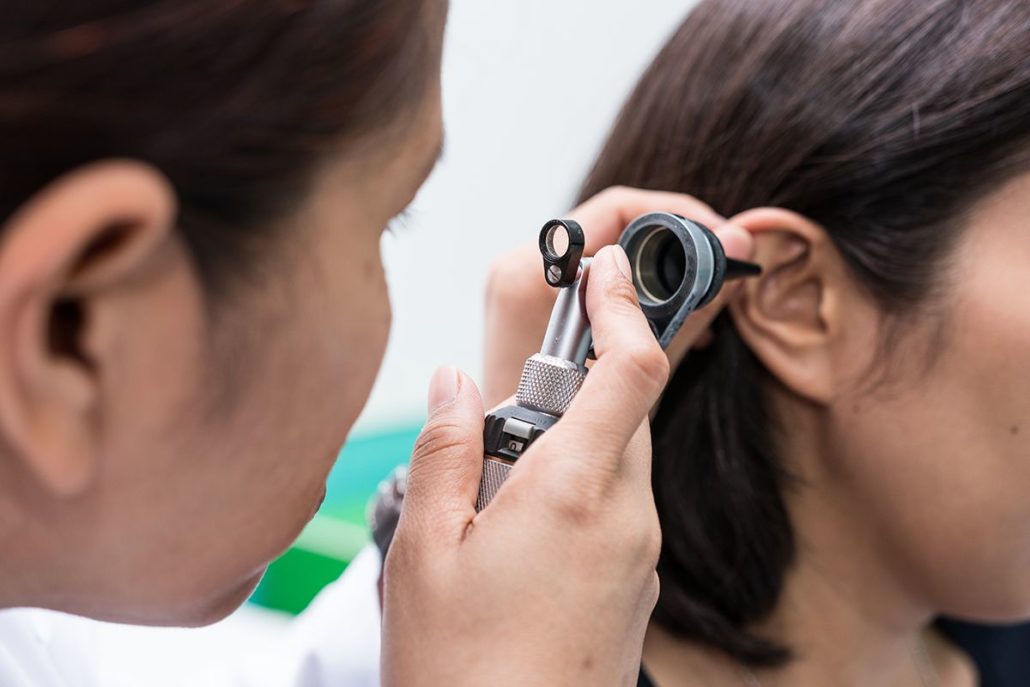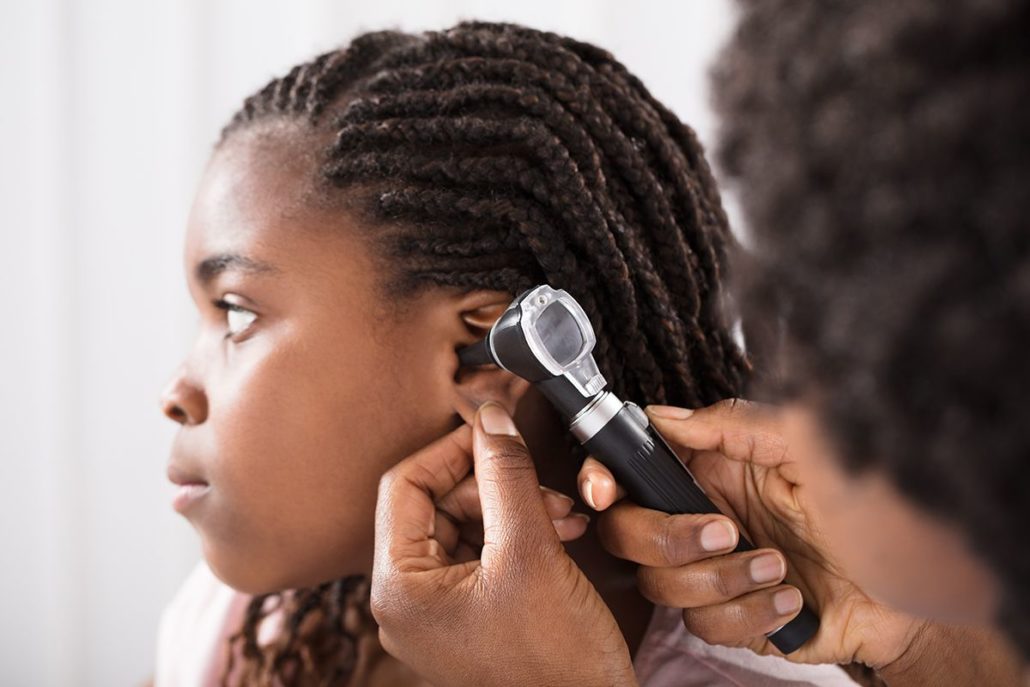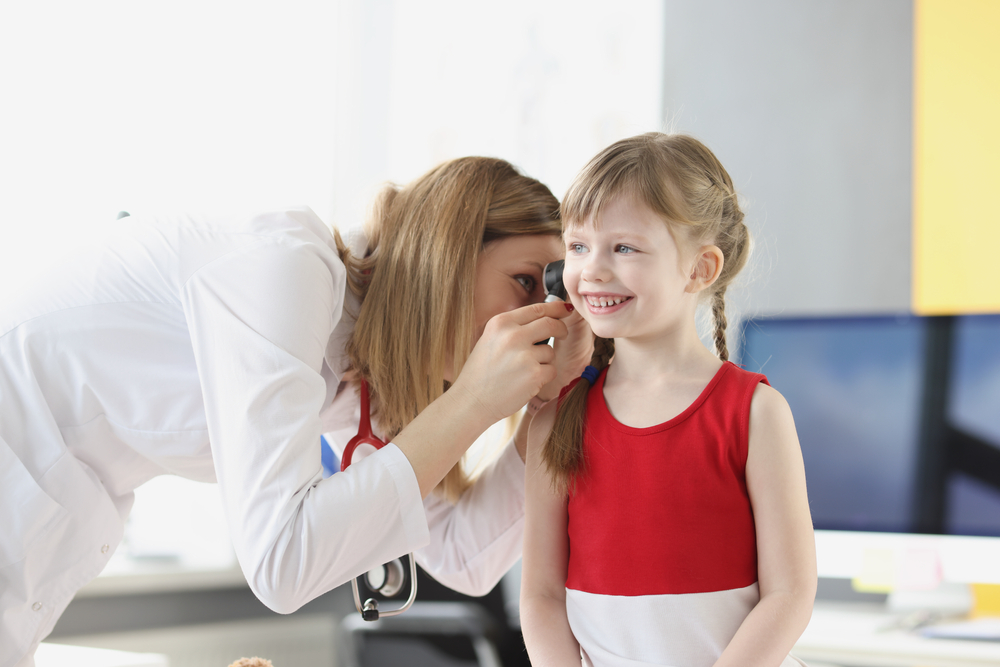
Hearing Loss Treatment
Hearing loss is a serious condition that many different factors can cause. Sudden deafness, in particular, is a symptom of some underlying disorder or injury and requires immediate medical attention. At Penn Medicine Becker ENT & Allergy our board-certified professionals specialize in diagnosing and treating this condition to ensure patients get the best possible treatment.
Our audiology team works in partnership with our New Jersey and Philadelphia ENT specialists to provide individualized treatment plans and ensure that all of our patients’ ear-related issues are properly addressed.
Our extensively-trained audiologists and physicians are pleased to offer a full range of services for hearing loss and related ear problems at several convenient New Jersey and Pennsylvania locations.
Hearing loss, recurrent and chronic ear infections, ear wax buildup, dizziness, eardrum perforations, ear fullness, Eustachian tube dysfunction, and tinnitus (ringing in the ears) are just some of the ear conditions treated by physicians and other providers at Penn Medicine Becker ENT & Allergy.
- About Hearing Loss
- Types of Hearing Loss
- Symptoms of Hearing Loss
- Hearing Testing
- Hearling Loss Consultation
- Treatment for Hearing Loss
- Pediatric Hearing Loss
- Factors That Contribute to Hearing Challenges in Children
- Evaluation of Hearing in Children: Assessing Auditory Function
- Treating Hearing Loss in Children
- Preventing Pediatric Hearing Loss
- Hearing Loss FAQs
About Hearing Loss
In order for us to hear, our ears have to have properly working outer, middle, and inner ears, as well as an intact auditory neural pathway to the part of the brain that hears and helps us to attach meaning to sound – the auditory cortex. This complex system often experiences problems that may lead to hearing loss.
Hearing loss is, simply put, a decreased sensitivity to sounds. Speech may sound muffled or difficult to understand, and you may find yourself asking others to speak more clearly or repeat what they are saying. You might find yourself turning up the TV or radio volume or withdrawing from conversations and avoiding social situations.
Loss of hearing is a widespread condition that affects approximately 35 million Americans. It is commonly associated with aging – 1 out of 3 people experience some degree of hearing loss by age 65 – but can occur in people of all ages. Hearing loss is often exacerbated by environmental factors such as exposure to noise. It is also sometimes a side effect of certain medications or illnesses.

Types of Hearing Loss
Hearing loss is characterized according to which part of the auditory system is affected. There are three main types: Conductive, Sensorineural, and Mixed.
Conductive hearing loss
Sensorineural hearing loss
Mixed hearing loss
Conductive hearing loss occurs when a sound reaches the inner ear at a reduced volume. Causes include ear infections, fluid in the middle ear from colds and allergies, impacted earwax, foreign objects in the ear, a perforated eardrum, benign tumor, or an abnormality or defect in the middle or outer ear. Medication or surgery can often successfully be used to treat the underlying condition and restore hearing.
Sensorineural hearing loss is a frequently encountered and enduring condition that arises when the delicate nerves connecting the inner ear or brain suffer damage, resulting in a permanent loss of hearing ability. Speech will sound faint or muffled, regardless of the volume or clarity of the person speaking. Causes include exposure to loud noise, head trauma, viruses or diseases, genetics, aging, inner ear abnormalities, tumors, and Meniere’s disease. This type of hearing loss – the most common – is rarely treatable with medication or surgery, but patients can usually benefit from hearing aids.
Mixed hearing loss manifests when there is impairment affecting the inner, middle, and outer ear, resulting in a combination of both types of hearing loss.
Most hearing loss occurs gradually. Noise-induced hearing loss happens when a person listens to loud noise for long periods. Sudden hearing loss is considered a medical emergency.
A person experiencing sudden hearing loss must be seen as quickly as possible by an ENT physician. The best possibility of improvement occurs after an immediate diagnosis and initiation of treatment. If no visible obstruction or viral infection is visible, a hearing test will determine the type and amount of hearing loss. The ENT physician may wish to prescribe medication and/ or imaging of the inner ears.

Symptoms of Hearing Loss
Hearing loss often occurs in a gradual manner, often meaning that the people with hearing loss are unaware of the problem. In many cases, hearing loss is first detected by a family member who is having to speak louder or repeat themselves on a regular basis. Some signs of hearing loss include:
- Turning the TV or radio volume louder than other family members prefer.
- Difficulty understanding speech in crowded settings such as restaurants and meetings.
- More difficulty hearing children and women than men.
- Complaints of ringing in the ears.
- Repeatedly asking for people to repeat what they say.
- Excessive sensitivity to loud sounds.
It is a good idea to seek out help from an audiologist as soon as possible if you notice symptoms of hearing loss. Early treatment is often much more successful than waiting until the problem gets worse. More advanced hearing loss can be difficult to treat with solutions like hearing aids or medication.
Hearing Testing
The audiometric test, or hearing test, is an important tool in ear health. We offer comprehensive hearing tests for children 2.5 years old and up, as well as adults and seniors.
A hearing test is quick, generally taking fifteen to twenty minutes. It is followed by an interpretation of the results and customized recommendations for the treatment and/or prevention of hearing loss. A complete report is provided to you and your physician.
Who Should Get Their Hearing Tested?
Regular hearing testing is recommended for people of all ages for a variety of reasons.
For children, hearing is a crucial component of the learning process. An undiagnosed hearing impairment can cause difficulty in acquiring learning, language, and social skills. In adults, hearing loss often comes on so gradually that people are unaware of the problem until it has progressed beyond a point where it is easily treatable.
People with hearing disabilities, those with a medical history of an illness that can lead to poor ENT health, and people over 55 years old should have their hearing checked routinely. Additionally, people who spend time in noisy environments (such as construction workers, musicians, or hunters) should take measures to prevent noise-related hearing loss and get their hearing tested regularly.
Take Our Online Hearing Evaluation
While we do recommend scheduling a hearing test with a member of our audiology team if you notice symptoms of hearing loss in yourself or a loved one, it can be helpful to perform a few simple tests at home before making an appointment.
Listed below are 7 questions related to hearing.
If you, your child, or loved one answer “Yes” to one or more of these questions, hearing loss may be present and you may want to consider a full evaluation with an audiologist.
- Do you have noises in your ears or head (ringing, buzzing, humming, etc)?
- Do you feel as though people are whispering or mumbling?
- Do you hear well in quiet rooms but have difficulty understanding speech when background noise is present?
- Is your television turned up louder than it used to be or louder than is comfortable for others?
- Do you have trouble understanding on the telephone? Do you have a “good ear” for the telephone?
- Do you have any pain, pressure, or drainage in or from either ear?
- Do you ask people to repeat themselves when speaking to you?
Audiological Evaluations at Penn Medicine Becker ENT & Allergy
An audiological evaluation at Penn Medicine Becker ENT & Allergy Center is straightforward and painless. Our Audiologists will begin your evaluation by asking some questions about your hearing loss. These may include:
- When did you start to notice your hearing loss?
- Which ear is worse?
- Are there other symptoms, like ringing, dizziness, or drainage from the ear?
- Do you have any congenital conditions?
- Are you exposed to loud noises in the workplace?
- Do you take any medications?
- Is there a family history of hearing loss?
Hearling Loss Consultation
After performing a thorough interview, our audiologists will examine your ears to rule out any simple anatomic reasons for your symptoms. Then, a series of hearing assessments will be performed.
The first part of the hearing test consists of objective testing or “automatic” tests; in other words, no answers are needed from the patient. The computers will get answers from each ear. The two tests done in this manner are middle ear testing and otoacoustic emissions. For middle ear testing, the patient feels a slight air pressure change then hears some louder tones, checking the eardrum and acoustic reflexes. During otoacoustic emissions the patient hears quiet tones; the inner ear sends a tone back that the computer records. This same test is used to check newborn babies’ hearing in the nursery.
The patient’s cooperation is needed for the actual hearing test. The patient sits in a spacious soundproof listening room. Many people report that once the earphones are in place, they can hear their breathing and heartbeat. If a person has tinnitus it may seem louder during the test in the listening room due to the lack of environmental sounds to mask.

This test is divided into two parts: speech testing and pure tones. For the pure tones, the patient pushes a button or verbally indicates that they hear a pulsed tone, each time it is heard. During speech testing, the patient will repeat back both very softly spoken words and words at a comfortable listening level. The audiologist will work with the patient to make the test as “user-friendly” as possible, giving people multiple opportunities to hear the tones and words.
Once testing is complete, the audiologists will review the results with you and offer their recommendations in detail.
Treatment for Hearing Loss
Nearly all hearing loss can be managed or treated to some degree. While inner ear hearing loss cannot be “fixed,” there are options for patients who would like to improve their hearing. The cause of the hearing impairment and the needs of the individual will help to determine the proper course of management. Regardless of the type of hearing loss you are experiencing, treatment options are available. Some options at Penn Medicine Becker ENT & Allergy include:
- Hearing Aids
- Medications for conditions such as ear infections
- Manual removal of impacted earwax
- Surgical correction for traumatic injury or congenital factors
- Cochlear implants for severe hearing loss that direct sound to the auditory nerve

Pediatric Hearing Loss
Some children are born with hearing loss, while others develop hearing impairment later in their development.
Early clues that babies may be hearing-impaired can include the absence of the Moro (startle) response to loud sound in the first several months of life (be aware that this response extinguishes in all babies, normal-hearing or hearing-impaired, after the third to fifth month) if there is significant hearing loss. They may also notice the cessation of cooing and babbling after the first six months for babies who are deaf (profoundly hearing-impaired).
For toddlers with hearing loss, there may be a delay of speech, few words understood or spoken, or poor pronunciation (articulation). Older children may complain of ringing in the ears (tinnitus), which often accompanies inner ear hearing loss.
None of these symptoms are conclusive indicators of hearing loss, but they should alert parents to the need for testing with an audiologist. The earlier hearing loss is found and treated, the better it is for the child and the child’s family.
Schedule your consultation
Factors That Contribute to Hearing Challenges in Children
Two very common and easily treated causes of hearing loss in children are the presence of earwax that occludes the canal, and middle ear fluid, which may or may not be infected. Earwax can often be removed safely from a child’s ear canal by the child’s pediatrician or ENT specialist and ear infections are typically easy to treat with home remedies or antibiotics.
The causes of more complex hearing loss include premature birth issues such as jaundice (hyper-bilirubinemia) or the momentary loss of oxygen flow for the baby (hypoxia), family hearing loss (inherited), genetic causes, loss from a severe illness or high fever, head trauma, intense noise trauma (such as airbag deployment near the ear), and certain medications.
Some children are born with a malformation of the outer, middle, or inner ear. If these children have other affected systems of the body, the child may be diagnosed with the syndrome and he may need to be followed by more than one medical specialist. Hearing loss in a child may be an indicator of other medical needs and issues and should be attended to in partnership with the child’s physician.
Evaluation of Hearing in Children: Assessing Auditory Function
Parents who notice indicators of hearing loss in their child should consult with an audiologist to diagnose any hearing issues, if present. Although non-reactions to loud sounds in the home can indicate the need for a hearing evaluation, parents should understand that this does not constitute a full assessment of a child’s hearing, as softer speech may not be heard.
Newborn Hearing Tests
The first hearing screening a child receives is typically in the nursery at the hospital, ideally 24 – 48 hours after birth. A hand-held computer sends closely matched tones into the baby’s ear and reads if a set of inner ear nerve cells react to the signal.
If the baby is crying, the test cannot be performed until the baby settles. This early hearing screening test, called Otoacoustic Emissions (OAE), is designed to rule out moderate hearing loss to severe hearing loss. However, the baby could still have a milder hearing loss. If the infant did not pass the hearing screening, the baby will be scheduled for follow up testing, usually a repetition of the test. It is very important to perform follow-up testing.
If the baby does not pass the second test, the child must be scheduled for Auditory Brainstem Response testing (ABR) with an audiologist. This is a lengthier test, typically about one hour if the baby stays asleep.
Because of these tests, some parents find out within one to two months of the baby’s birth if the baby is hearing impaired. They will probably not yet have any behavioral clues of a child’s hearing loss at that age.
Hearing Tests for Toddlers and Children
For toddlers and older children, a hearing test is performed in a sound-treated booth. The toddler sits on a parent’s lap facing a pair of speakers and the testing audiologist. When the audiologist’s voice or sound stimuli are presented to the child through the speakers the toddler will turn to the sound. Animated toys reinforce the response. Some toddlers will respond to commands such as, “Clap hands,” or “Where is Mommy?” This does not give ear-specific information. The results will be interpreted for you by the audiologist.
Older children can drop a block or press a button when they hear the speech stimuli or sound through insert earphones. They can point to pictures or repeat back words. Their testing and results will be much like that of an adult. The audiologist will explain the results and recommendations.
Treating Hearing Loss in Children
If a child’s hearing loss is caused by excess ear wax, it should be relatively easy to treat. Other types of hearing loss will require a more in-depth treatment plan.
Parents will need to explore ways to help their children overcome any obstacles that may be created by early hearing loss. A team approach with the parents, audiologist, Ear, Nose, and Throat physician, school counselor or social worker, speech-language pathologist, and teacher(s) helps each family decide the best educational options for the child.
Inner Ear Hearing Loss Treatment
If it is found that a child has inner ear (sensorineural) hearing loss in one or both ears, the audiologist will advise parents of their hearing and educational options.
Inner ear loss is not able to be changed by medical management. The best way to help most children with inner ear hearing loss is through the use of digital hearing aids. The earlier that amplification is fitted for children with inner ear hearing loss, the more likely they will not fall behind academically, in college, or in the workforce.
Cochlear Implants for Deafness
Children who are born deaf (meaning no usable hearing, not those with mild to profound hearing loss ) may receive no benefit from hearing aids. In cases where the parents wish for the deaf child to be a member of the Deaf community, hearing aids are not a viable option. American Sign Language would be taught to children of the Deaf community.
If parents want their deaf children to have the opportunity to hear, they may opt for one or two cochlear implants. These are surgically implanted devices that send electrical signals to the auditory system, bypassing the inner ears that are not sending the signals.
One month after the surgery the child is fitted for an external processor. The family and child learn how to use the cochlear implant. The child would receive speech therapy and auditory-verbal therapy to enhance understanding of the incoming signal. Frequent reprogramming, or “mapping,” helps the child have access to more sound.
Preventing Pediatric Hearing Loss
Some causes of hearing loss in children cannot be prevented. However, all children need to be aware of the dangers of acquired hearing loss and the permanent onset of ringing in the ears (tinnitus) from loud music, sports arenas, firearms, and power tools.
Even one excessively loud concert can permanently alter hearing or bring on ringing. The damaging sound from the event may not cause pain or discomfort, so there is no way of judging that it is harming the inner ears. Earplugs and other protective devices should always be used in excessively noisy situations for both children and adults.
Even everyday, seemingly harmless activities such as using earbuds can cause damage long-term. Children should take breaks from listening to music with earbuds and parents should consider purchasing special inexpensive volume-limiting earphones to help preserve hearing in children.

Why Choose Our Audiologists
At Penn Medicine Becker ENT & Allergy, our experienced audiologists work with board-certified ENT physicians to provide quality care for patients all across New Jersey. Each one of our audiologists are highly trained in audiology, with many of our experts holding a doctorate in the specialty. They work with each patient to find solutions that work for the individual and improve their quality of life.
- Paris M. Atabek, Au.D. is a dedicated clinical audiologist at Penn Medicine Becker ENT & Allergy. She earned her Bachelor of Science from Pennsylvania State University and her Doctorate of Audiology from James Madison University, training at A.I. duPont/Nemours Children’s Hospital. Licensed in New Jersey and Pennsylvania, she holds a Certificate of Clinical Competence in Audiology (CCC-A) and specializes in hearing and balance disorders, providing compassionate, personalized care to improve patients’ quality of life.
- Elena Ballezzi, Au.D. is a highly respected audiologist at Penn Medicine Becker ENT & Allergy with over 25 years of experience in hospital, private practice, and ENT settings. She earned her Bachelor of Science from SUNY University at Buffalo, a Master of Arts from The College of New Jersey, and a Doctorate of Audiology from Salus University. A Fellow of the American Academy of Audiology, Elena specializes in hearing disorders, amplification, balance challenges, and central auditory processing, providing personalized solutions that enhance both hearing and quality of life.
- Amanda Bange-Smith, Au.D., CCC-A is a dedicated audiologist at Princeton Otolaryngology Associates, specializing in hearing health, balance disorders, and hearing aid technology. She earned her Doctorate of Audiology from Syracuse University and her undergraduate degree from Andrews University, bringing extensive experience in diagnostic audiology and patient care for all ages.
- Kathryn DuBois, Au.D. is a licensed audiologist at Becker ENT & Allergy, specializing in hearing and balance disorders. She earned her Bachelor of Science from Bloomsburg University of Pennsylvania and her Doctorate of Audiology from the University of Maryland, completing clinical training at JFK University Medical Center. Licensed in New Jersey and holding a Certificate of Clinical Competence in Audiology (CCC-A), she is dedicated to providing patient-centered care, offering tailored solutions to improve hearing health and overall well-being.
- Josephine Han, Au.D. is a clinical audiologist at Penn Medicine Becker ENT & Allergy, specializing in hearing and balance care. She earned her Doctorate of Audiology from the University of Texas at Dallas and is licensed in New Jersey with ASHA certification. Dedicated to patient-centered, evidence-based care, she provides personalized solutions for all ages.
- Karen Herring, M.S. is an experienced audiologist with nearly 28 years in hearing rehabilitation, specializing in hearing aids and advanced audiologic testing. She earned her Bachelor of Science from West Virginia University and her Master of Science in Audiology from Florida State University. With expertise in balance disorder testing, she has worked with top ENT specialists and is skilled in VNG, ABR, and VEMP evaluations, providing comprehensive hearing care.
- Karen McQuaide, Au.D. is a specialty-trained audiologist with over 20 years of experience at academic and private audiology and balance disorder practices. She has served in leadership positions at New York University, Temple University, University of Florida, and Robert Wood Johnson University Hospital to name a few.
- Vyvian Queenan, Au.D. is a licensed audiologist at Becker ENT & Allergy, specializing in hearing care for all ages. She earned her Bachelor of Arts from Rutgers University and her Doctor of Audiology from Montclair State University, completing her clinical residency at Weill Cornell Medicine. Holding a Certificate of Clinical Competency from ASHA, she is dedicated to providing patient-centered care with expertise in audiology and ontology.
- Catherine Rutherford, Au.D. is a clinical audiologist specializing in hearing and balance care for all ages. She earned her Doctorate of Audiology from Bloomsburg University and is licensed in New Jersey with ASHA certification. With experience in ENT settings, she is dedicated to patient-centered care and personalized hearing solutions.
- Kyle T. Smith, Au.D. is a classically trained musician and audiologist with a unique background in sound design and engineering. He earned his Bachelor of Music from William Paterson University and his Doctorate of Audiology from Montclair State University. Holding a Certificate of Clinical Competency from ASHA, he specializes in hearing loss, balance disorders, and hearing aid programming, offering patient-focused care with a deep understanding of sound and auditory health.

Pick one of our convenient locations
for your Hearing Loss Treatment

